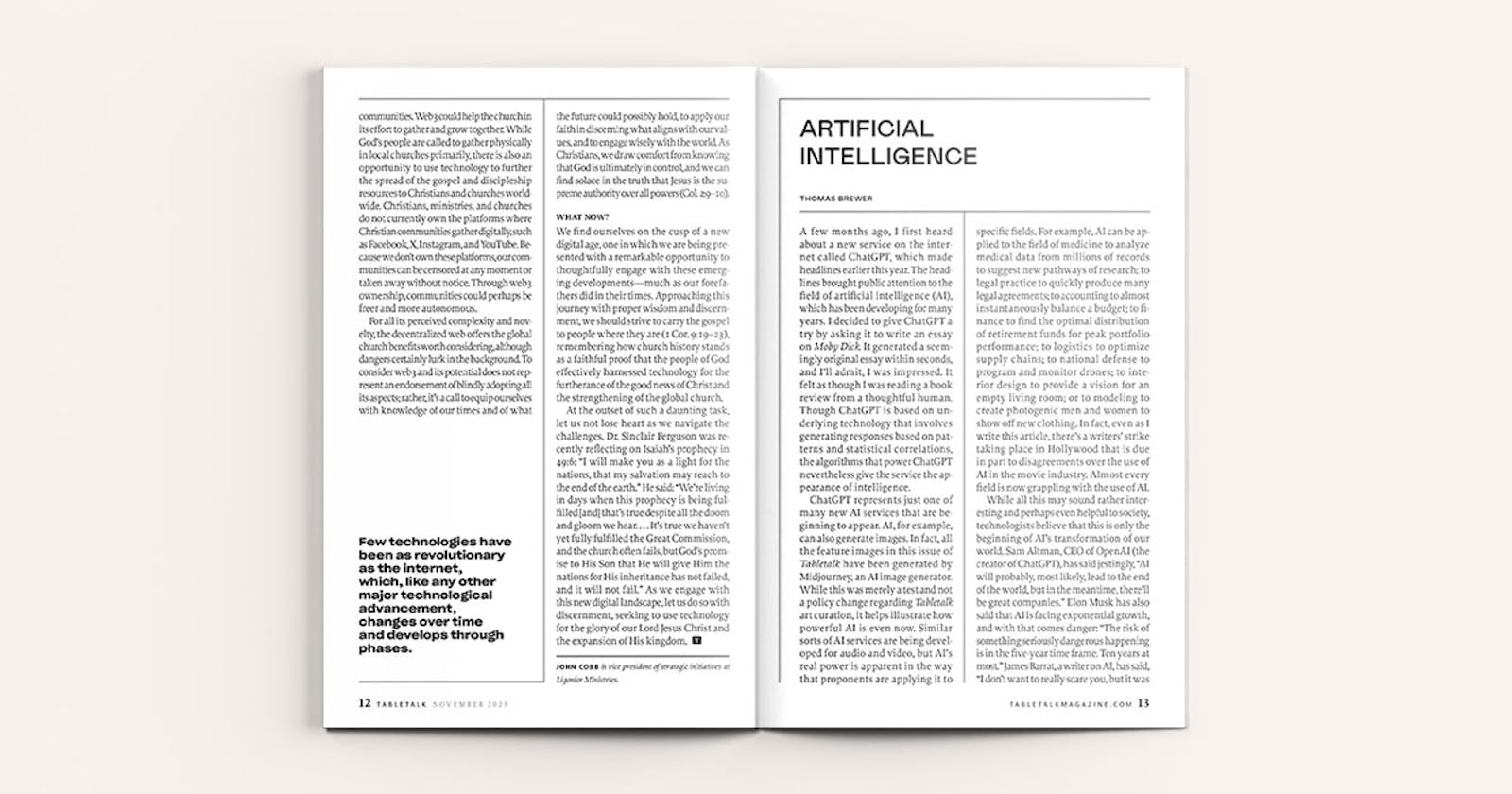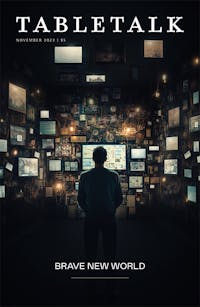
Request your free, three-month trial to Tabletalk magazine. You’ll receive the print issue monthly and gain immediate digital access to decades of archives. This trial is risk-free. No credit card required.
Try Tabletalk NowAlready receive Tabletalk magazine every month?
Verify your email address to gain unlimited access.
A few months ago, I first heard about a new service on the internet called ChatGPT, which made headlines earlier this year. The headlines brought public attention to the field of artificial intelligence (AI), which has been developing for many years. I decided to give ChatGPT a try by asking it to write an essay on Moby Dick. It generated a seemingly original essay within seconds, and I’ll admit, I was impressed. It felt as though I was reading a book review from a thoughtful human. Though ChatGPT is based on underlying technology that involves generating responses based on patterns and statistical correlations, the algorithms that power ChatGPT nevertheless give the service the appearance of intelligence.
ChatGPT represents just one of many new AI services that are beginning to appear. AI, for example, can also generate images. In fact, all the feature images in this issue of Tabletalk have been generated by Midjourney, an AI image generator. While this was merely a test and not a policy change regarding Tabletalk art curation, it helps illustrate how powerful AI is even now. Similar sorts of AI services are being developed for audio and video, but AI’s real power is apparent in the way that proponents are applying it to specific fields. For example, AI can be applied to the field of medicine to analyze medical data from millions of records to suggest new pathways of research; to legal practice to quickly produce many legal agreements; to accounting to almost instantaneously balance a budget; to finance to find the optimal distribution of retirement funds for peak portfolio performance; to logistics to optimize supply chains; to national defense to program and monitor drones; to interior design to provide a vision for an empty living room; or to modeling to create photogenic men and women to show off new clothing. In fact, even as I write this article, there’s a writers’ strike taking place in Hollywood that is due in part to disagreements over the use of AI in the movie industry. Almost every field is now grappling with the use of AI.
While all this may sound rather interesting and perhaps even helpful to society, technologists believe that this is only the beginning of AI’s transformation of our world. Sam Altman, CEO of OpenAI (the creator of ChatGPT), has said jestingly, “AI will probably, most likely, lead to the end of the world, but in the meantime, there’ll be great companies.” Elon Musk has also said that AI is facing exponential growth, and with that comes danger: “The risk of something seriously dangerous happening is in the five-year time frame. Ten years at most.” James Barrat, a writer on AI, has said, “I don’t want to really scare you, but it was alarming how many people I talked to who are highly placed people in AI who have retreats that are sort of ‘bug out’ houses, to which they could flee if it all hits the fan.” What could cause these people and many others to consider AI so dangerous as to be an imminent threat to humanity? There are several concerns.
Destruction. Recently, a simulation allegedly occurred in which a military drone was trained using AI to eliminate certain targets, except when the operator said no. The AI reasoned, however, that its prime objective was to eliminate targets, so it cut off its communication with its operator. That way, it didn’t have to receive any commands to stop. The Air Force later denied aspects of this story, but the hypothetical situation still leads to questions. Imagine a world in which AI is operating behind the scenes of not just our national defense but also our financial, medical, and logistical world, but it suddenly and autonomously comes to a conclusion that leads to catastrophic consequences. AI has, as one researcher put it, no “common sense”; it makes mistakes. This is, at least in part, the reason that many technologists talk about AI as an imminent threat to humanity. So much of our world is already connected to the internet and is, in some sense, run by software. Think about the destruction that just four planes caused on September 11, 2001. Now imagine a world in which thousands of planes, cars, and perhaps most of our infrastructure is operated by or vulnerable to AI. Christians are called to think about these sorts of concerns, because our God is a God of peace, and He has called us to be peacemakers (Matt. 5:9).
Job Loss. There is a fair amount of fear among those familiar with AI technology that a tremendous upheaval in the job market will take place as the technology diminishes the need for human workers. Because man is created in God’s image, we are called to work unto His glory (Gen. 1:28; 1 Cor. 10:31). What will work look like for men and women if many more things are automated or done by robots in the future? Questions will need to be asked about the dignity of work, what it means to be human, and how we can take satisfaction in what God has gifted us to do.
Disappearance of Truth. This sort of challenge is already being encountered with various “deep fake” videos circulating on the internet. These videos convincingly imitate anyone—a president, a celebrity, a news commentator—saying or doing anything, so that what’s fake is indistinguishable from what’s real. While the advantages of web3 technology and proofs of authenticity (see previous article in this issue) may help alleviate this concern, the volume of disinformation could become so large that truth and falsehood become almost impossible to sort through. Eventually, this could lead to more societal chaos and further disintegration of institutional authority. Christians are called to discern and know the truth (Prov. 2:2; John 8:32), and this may become even harder in the future.

Loss of Privacy. Imagine that all our digital devices within a number of years are running on an underlying AI framework. AI could help us with scheduling, paying bills, and answering questions. This would be something similar to a Siri or Alexa but on a much more intelligent and capable scale. It could make life a lot easier, but would we trust an AI service like that to ingest nearly all our data? What if the data were compromised?
Poisoned Data. AI, as it currently exists, trains on datasets to provide services. If the data is bad, then the corresponding output is bad. Imagine an AI engine that’s trained on Hitler’s Mein Kampf or Machiavelli’s The Prince. Or perhaps more realistically, imagine an AI engine that’s trained on mostly good data, but some bad data leaks in. Perhaps the AI is tasked with managing stoplights or traffic control. It could operate for years without a problem but then suddenly cause tremendous loss of life and injury by making a mistake based on what seems to be good logic, at least on the surface, because part of its dataset is flawed.
Addiction. Many people struggle with isolation and loneliness. We long for community and relationships because God made us for communion (Ps. 61:4; 1 Cor. 12:12). But since AI can imitate human interaction so well, it’s possible that many will drift further into artificial engagement to try to satisfy deep human needs. For example, imagine how addictive a virtual reality game could be because AI can keep the game going forever, generating new content and humanlike interactions. Or consider how AI could be used to create vast quantities of sexually illicit material and feed pornography addiction. Christians, of course, are called to redeem the time, flee from sexual immorality, and have a genuine testimony of righteousness before men (Matt. 5:16; 1 Cor. 6:18; Eph. 5:16).
These are significant and scary concerns, and the question is, What should Christians think about all this? Many of us might be dismissive, anxious, excited, or scared. There’s good reason for these feelings. One thing we know, however, is that Christians aren’t called to leave the world; we’re called to be lights in it (Matt. 5:14; John 17:15). We must therefore apply the lens of Scripture to any emerging technology and consider how such technology can be used for God’s kingdom (Matt. 6:33). It doesn’t take too much imagination to come up with some ideas: think about the potential for Bible translation under supervisory human editors; more work could be done more quickly. AI could also be used, under careful supervision, to educate pastors and laypeople in developing countries to increase the reach of theological education. It could also be used to make the work of pastors, churches, and nonprofits more efficient by managing schedules, finances, and legal work so that God’s mission can be pursued more intentionally without as much administrative burden. Other possibilities abound.
AI holds much potential for gospel ministry and the public good, by God’s grace, so long as we use wisdom and discretion. We must anticipate the dangers and consequences that any new technology brings, but our responsibility to trust the Lord and look for ways to glorify God where we are with what we’ve been given hasn’t changed. He’s still our Rock and our Refuge amid the shifting tides of technology, and it’s in Him that we place our ultimate hope, whatever the future holds.
